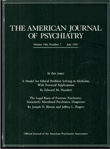Problem behaviors and peer interactions of young children with a manic- depressive parent
Abstract
By the age of 2 years, children with a manic-depressive parent were already found to be experiencing substantial psychiatric problems. The authors examined the ways in which these early problems then become embedded in social relationships. Naturalistic observations and experimental manipulations of the emotional environment were used to measure 2-year-old children's regulation of emotion, aggression, and altruism during peer interactions. Children with a manic-depressive parent had difficulty in sharing with their friends and in handling hostility, showing maladaptive patterns of aggression. The social and emotional problems of these children were similar to the interpersonal problems of their manic-depressive parents.
Access content
To read the fulltext, please use one of the options below to sign in or purchase access.- Personal login
- Institutional Login
- Sign in via OpenAthens
- Register for access
-
Please login/register if you wish to pair your device and check access availability.
Not a subscriber?
PsychiatryOnline subscription options offer access to the DSM-5 library, books, journals, CME, and patient resources. This all-in-one virtual library provides psychiatrists and mental health professionals with key resources for diagnosis, treatment, research, and professional development.
Need more help? PsychiatryOnline Customer Service may be reached by emailing [email protected] or by calling 800-368-5777 (in the U.S.) or 703-907-7322 (outside the U.S.).



